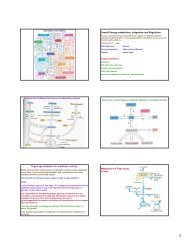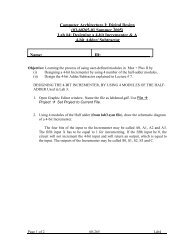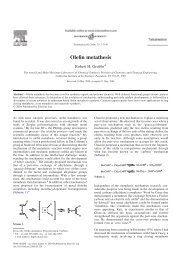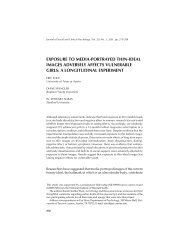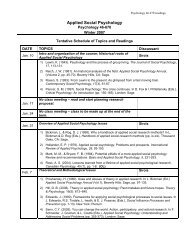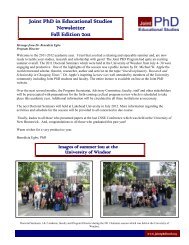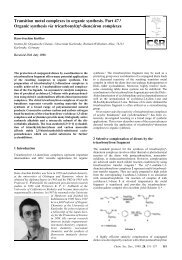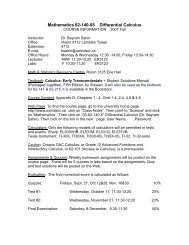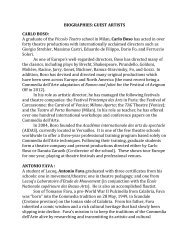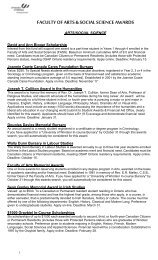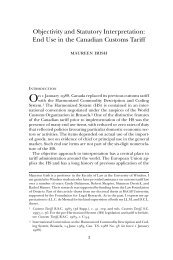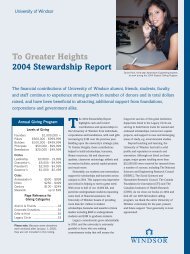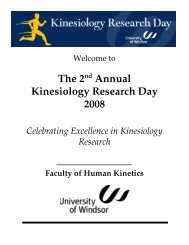Critical Social Work - University of Windsor
Critical Social Work - University of Windsor
Critical Social Work - University of Windsor
You also want an ePaper? Increase the reach of your titles
YUMPU automatically turns print PDFs into web optimized ePapers that Google loves.
Brown<br />
Anti-Oppression Through a Postmodern<br />
Lens: Dismantling the Master’s<br />
Conceptual Tools in Discursive <strong>Social</strong><br />
<strong>Work</strong> Practice<br />
<strong>Critical</strong> <strong>Social</strong> <strong>Work</strong> 13(1)<br />
Catrina G. Brown 1<br />
1 Dalhousie <strong>University</strong><br />
Abstract<br />
Anti-oppression discourse has emerged within critical social work in an effort to address issues<br />
<strong>of</strong> diversity, difference, and inclusion. Drawing upon Audre Lorde’s (1984) famous words “the<br />
master’s tools will never dismantle the master’s house” this paper will argue that modernist<br />
aspects <strong>of</strong> anti-oppressive discourse may unwittingly deploy the masters’ or dominant conceptual<br />
tools. A critical reflexive lens identifies unintended, modernist conceptual practices <strong>of</strong> power<br />
which may reify dominant discourse. Specifically I focus on three modernist practices <strong>of</strong> power<br />
which may limit anti-oppression discourse: 1) the essentialism <strong>of</strong> the subject, 2) subjectivism or<br />
writing out the social, and 3) the reproduction <strong>of</strong> dominant social discourse. Through exploring<br />
these three related domains, I argue for a blending <strong>of</strong> modernist and postmodernist assumptions<br />
which holds onto the strengths <strong>of</strong> both modernism and postmodernism while abandoning their<br />
limitations. This blended approach will facilitate a critically reflexive anti-oppressive practice.<br />
KEYW ORDS: Anti-oppression, postmodernism, social work practice, reflexivity<br />
Introduction<br />
Anti-oppression discourse has emerged within critical social work in an effort to address<br />
issues <strong>of</strong> diversity, difference, and inclusion. Drawing upon Audre Lorde’s (1984) famous words<br />
“the masters tools will never dismantle the master’s house” this paper will argue that modernist<br />
aspects <strong>of</strong> anti-oppressive discourse may unwittingly deploys the masters’ or dominant<br />
conceptual tools. As conceptual practices <strong>of</strong> power, these dominant conceptual, ideological, and<br />
discursive tools cannot then dismantle oppressive discourses and social relations despite their<br />
intention to do so. On the contrary, although unintended, modernist conceptual practices <strong>of</strong><br />
power within anti-oppression discourse may actually reify dominant discourse and in doing so<br />
existing relations <strong>of</strong> power (Brown & Augusta-Scott, 2007a, 2007b). A postmodern lens may<br />
heighten critical epistemological reflexivity about our discursive practices, advancing the social<br />
<strong>Critical</strong> <strong>Social</strong> <strong>Work</strong>, 2012 Vol. 13, No. 1<br />
34




